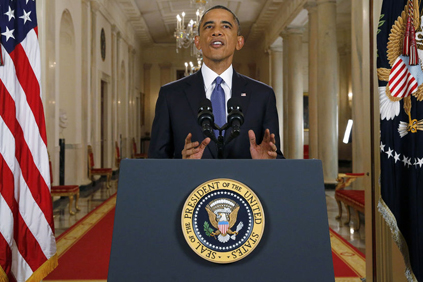
On November 20, 2014, President Obama stood in the West Wing of the White House and presented his plans regarding immigration reform, the use of executive orders on his part to make up for a lack of congressional action. This move is a highly contentious one as it brings into question the very constitution which the president swears to uphold, for no place in the 226 year old document are such unilateral executive actions mentioned. But before the politics of the issue can be spoken about, the facts and logistics of the executive order President Obama announced must be understood.
Some of the less brazen reform measures being taken by the administration include the restructuring of the “Secure Communities” program which previously allowed federal agents to ask local officials to hold illegal aliens, even for trivial crimes and infractions they would otherwise walk away from, so they could be picked up and deported. The general focus of deportation in the US is also being overhauled to focus more specifically on immigrants who have been convicted of serious crimes and those who were ordered deported or entered the US in 2014. The opportunities for obtaining a visa have also been expanded to include easier processes for foreign entrepreneurs and for spouses of current visa holders. The Optional Practical Training program, which allows foreign students to remain in the US after graduation for work, has also been expanded to include an extended stay period for those in STEM (Science, Technology, Engineering, and Mathematics) fields.
However the flagship of these changes are massive expansions to DACA (Deferred Action for Childhood Arrivals) eligibility. The program allows those covered to get temporary protection from deportation as well as work permits. Currently only a small group (1.2 million) of people are covered, those who meet a very specific set of prerequisites regarding their age, their date of arrival to the US, their criminal record, and their place of residence among other things. But President Obama intends to expand the program to provide eligibility to a wider range of people under the current regulations as well as the parents of current citizen or green-card-holding children who’ve been in the country for 5 or more years, expanding the number covered to an expected total of approximately 5.7 million.
Compared to the more modest reform action being taken by President Obama noted earlier in this article, the changes made with respect to DACA are astronomical, but its success is dubious. While the numbers say that 5.7 million immigrants will gain the benefits of temporary work permits and will allowed to temporarily remain in the country, it is unknown how many will choose to, as President Obama said, “come out of the shadows.” The executive order’s changes may seem like a godsend to many immigrants living in fear of deportation, but it is not true legislation, and because of this any future president (or even congress should it pass comprehensive immigration legislation) could end the program, conceivably even using the information gained about illegal immigrants from this new process to deport them more aggressively and specifically. This means that many who may benefit from President Obama’s executive order will not even take advantage of what it provides them.
Aside from the ethics and success of this executive order, many people and politicians are now bringing economics and logistics into it in an attempt to weaken and hopefully destroy the President’s plan before it can even begin. While there are of course opponents to the action on both sides of the aisle, Republicans are most vocal about the issue claiming that any changes similar to the ones drafted by President Obama are direct affronts to the constitution and shall lead to only more problems for hardworking Americans as well as the country as a whole. They claim that jobs will be stolen away by the new pool of immigrants eligible for more “white collar” work and that many will game the system and stay even when they aren’t covered by new rules. Of course there is also the angle on National Security, or the lack thereof should President Obama go through with his executive order. But in the end what we see again is more fear-mongering by politicians.
Of course it is reasonable to consider all the implications of such a far reaching policy at home and abroad, but the claims being made are erroneous and oftentimes blatantly untruthful. Take for example the recent relabelling of the plan as one meant to provide “amnesty” for immigrants flouting the law, something President Obama never said in his speech. In fact, he said himself that “mass amnesty would be unfair” and that while “some of the critics call it amnesty … it’s not.”
Many are also calling attention to the legality of such an action by the President, and are stating outright that it is unconstitutional. But somehow all of the interviews and statements and articles that those opposed to the action are putting forward conveniently leave out the fact that executive orders are exceedingly common, and that even executive orders pertaining to immigration are seen quite often. President Bush even took action on immigration through the use of executive orders, unchallenged during his presidency. It is admittedly necessary to discuss the constitutionality of such a far reaching action, but it is just as duplicitous to make unsubstantiated and unsupported claims to the American people in attempts to convince them to oppose the action as it is to avoid discussion altogether.
In the end, all of this is expected in the highly partisan system that the United States has today, and it has consistently been seen on both sides, but that doesn’t make it right or just. Politicians sitting in their ivory towers can fight back and forth ostensibly for the protection of their constituents and the country, but they are oftentimes fighting only for themselves. They want to gain power if they don’t have it or keep it if they do, and that means that they are willing to mislead the public and unnecessarily attack legislation and actions coming from the other party, even if it means hurting those whom they are sworn to serve. Without seeing the executive order implemented no one can fully and accurately predict its results, but for that same reason without trying to push the boundaries of our political and legal system, nothing would ever change, for better or for worse.

